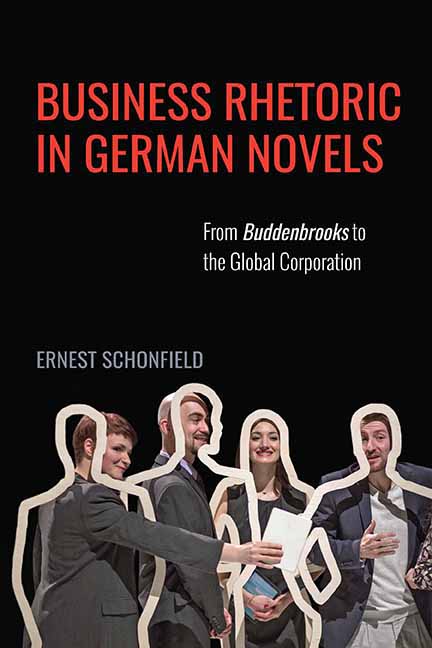Book contents
- Frontmatter
- Dedication
- Contents
- Acknowledgments
- List of Abbreviations
- Introduction
- 1 Managing Appearances in Thomas Mann's Buddenbrooks, 1901
- 2 Oratory and Publicity in Heinrich Mann's Der Untertan, 1914/18
- 3 Organizing Speech in Gabriele Tergit's Käsebier erobert den Kurfürstendamm, 1931
- 4 Seeing through the Rhetoric in Bertolt Brecht's Dreigroschenroman, 1934
- 5 Giving an Account of the Self in Ingeborg Bachmann's Malina, 1971
- 6 Negotiating Bureaucracy in Hermann Kant's Das Impressum, 1972
- 7 Corporate Discourse in Friedrich Christian Delius's Unsere Siemens-Welt, 1972
- 8 Producing Ethos in Kathrin Röggla's wir schlafen nicht, 2004
- 9 Communicative Contests in Philipp Schönthaler's Das Schiff das singend zieht auf seiner Bahn, 2013
- Conclusion
- Notes
- Bibliography
- Index
4 - Seeing through the Rhetoric in Bertolt Brecht's Dreigroschenroman, 1934
Published online by Cambridge University Press: 15 August 2018
- Frontmatter
- Dedication
- Contents
- Acknowledgments
- List of Abbreviations
- Introduction
- 1 Managing Appearances in Thomas Mann's Buddenbrooks, 1901
- 2 Oratory and Publicity in Heinrich Mann's Der Untertan, 1914/18
- 3 Organizing Speech in Gabriele Tergit's Käsebier erobert den Kurfürstendamm, 1931
- 4 Seeing through the Rhetoric in Bertolt Brecht's Dreigroschenroman, 1934
- 5 Giving an Account of the Self in Ingeborg Bachmann's Malina, 1971
- 6 Negotiating Bureaucracy in Hermann Kant's Das Impressum, 1972
- 7 Corporate Discourse in Friedrich Christian Delius's Unsere Siemens-Welt, 1972
- 8 Producing Ethos in Kathrin Röggla's wir schlafen nicht, 2004
- 9 Communicative Contests in Philipp Schönthaler's Das Schiff das singend zieht auf seiner Bahn, 2013
- Conclusion
- Notes
- Bibliography
- Index
Summary
It is more desirable to seem just than to be just.
—AristotleIntroduction: The Black Book of Clichés
IN DIE LITERARISCHE WELT (The Literary World) of May 21, 1926, German authors were asked to respond to the following question: “Welche stilistische Phrase hassen Sie am meisten?” (Which stylistic cliché do you hate most?). Bertolt Brecht (1898–1956) responded, “Die Phrasen, die hassenswert sind, sind Legion. Es wäre falsch, eine beliebige herauszufischen. Man müßte eine Enzyklopädie, ein Schwarzbuch der Phrase herausgeben” (The clichés worth hating are legion. It would be mistaken to select one random phrase. What is needed is an encyclopedia, a black book of clichés). Eight years later, he published a novel that can be read as precisely that: the Dreigroschenroman. David Bathrick has noted that Brecht's works often consider the problem of manipulation in mass society. This is especially true of the Dreigroschenroman. As a refugee from Hitler from 1933 onward, Brecht developed an acute diagnosis of the ideological manipulations of the Nazi party in his plays, poetry, and prose writings. Dreigroschenroman, written in the winter of 1933–34 with the assistance of Margarete Steffin, is the first major work Brecht produced in exile. It explores the connections between language and power, analyzing linguistic strategies used by economic and political actors alike in order to influence the public.
In August 1934 Brecht instructed his Amsterdam-based publisher, Allert de Lange, to print passages of the Dreigroschenroman in italics to convey the impression that certain phrases were being quoted and exhibited (BFA 28:433). Walter Benjamin, in his 1935 review of the novel, emphasized Brecht's use of italics, observing that Brecht had created “eine Sammlung von Ansprachen und Sentenzen, Bekenntnissen und Plädoyers …, die einzig zu nennen ist” (a collection of addresses and maxims, affirmations and pleas, which is unique). This chapter argues that the Dreigroschenroman is a novel that exhibits certain types of discourse to show how language is used to exert political and economic influence. George Orwell made a similar point in the essay “Politics and the English Language” (1946), where he observes: “Political language … is designed to make lies sound truthful and murder respectable, and to give an appearance of solidity to pure wind.”
- Type
- Chapter
- Information
- Business Rhetoric in German NovelsFrom Buddenbrooks to the Global Corporation, pp. 78 - 97Publisher: Boydell & BrewerPrint publication year: 2018

